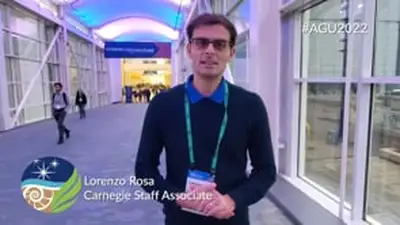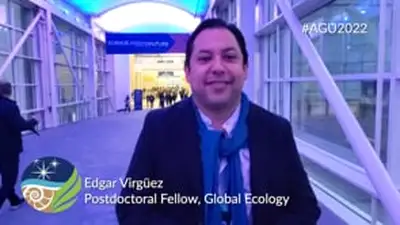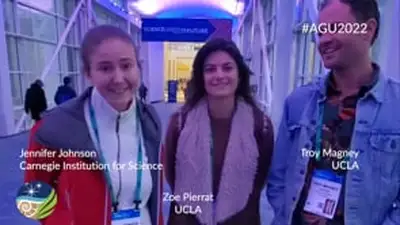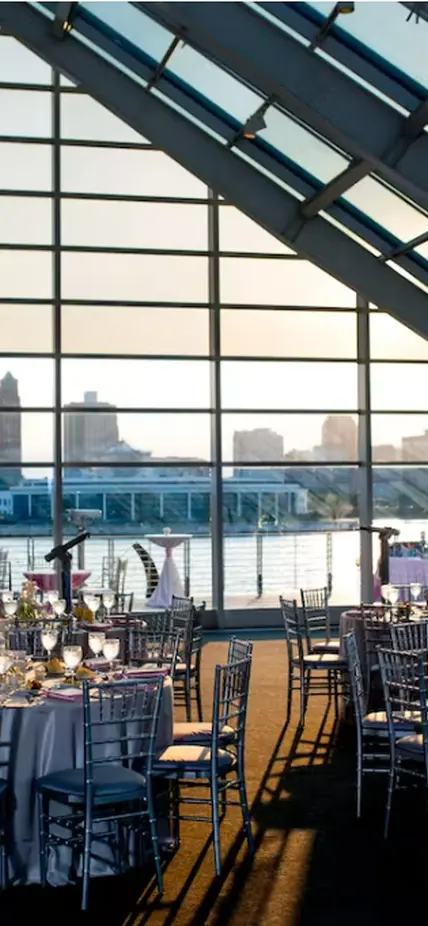Catching Up With Carnegie Ecologists at AGU

Lorenzo Rosa #AGU2022

Edgar Virgüez_AGU2022

Jennifer Johnson and Colleagues_AGU2022
@CarnegieEcology at #AGU2022
Our @CarnegiePres Eric D. Isaacs welcomes everyone to our 2022 @theAGU alumni reception at @AdlerPlanet. We are so pleased to be gathering with our friends and colleagues in person again in beautiful Chicago. pic.twitter.com/YnSTLT3Bre
— Carnegie Science (@carnegiescience) December 12, 2022
@CarnegieEcology & @stanforddoerr's @ScienceKelsey presents a digital poster at #AGU2022 on efforts to evaluate how much carbon emissions are offset by the terrestrial biosphere. pic.twitter.com/H6n8F4mX37
— Carnegie Ecology (@CarnegieEcology) December 12, 2022
.@caltech grad student and @KenCaldeira collaborator @JackieADowling is presenting her work at #AGU2022. She found that reducing hydrogen storage and conversion capital costs reduces wind and solar system costs more than round-trip efficiency improvements. pic.twitter.com/JFY4gK4UYQ
— Carnegie Ecology (@CarnegieEcology) December 12, 2022
.@caltech undergrad @annaxli26 is presenting her work with @KenCaldeira at #AGU2022. She evaluated different portfolios of short-, mid- and long-duration storage technologies in reliable wind and solar electricity systems. pic.twitter.com/rmhxPMommS
— Carnegie Ecology (@CarnegieEcology) December 12, 2022
.@KenCaldeira discusses his poster at #AGU2022, which showcases a variety of investigations into various strategies for near-term actions that would help facilitate century scale energy system transitions to net zero emissions. pic.twitter.com/w3ThAHqupn
— Carnegie Ecology (@CarnegieEcology) December 12, 2022
Italian climate scientist and engineer @TheRosaLab tries Chicago-style deep dish pizza for the first time while in town for #AGU2022, says "it's not pizza, but it's good." This kind of cultural exchange is a hallmark of @theAGU Fall Meeting. Plus, you know, all the great science. pic.twitter.com/TqG6S4d1XH
— Carnegie Science (@carnegiescience) December 13, 2022
.@TheRosaLab is at #AGU2022 presenting an overview of his recent research on water scarcity and sustainable irrigation. Rainwater is not enough to meet crop demands under current conditions and the challenge will increase with climate change. pic.twitter.com/so2keF0lQH
— Carnegie Ecology (@CarnegieEcology) December 13, 2022
Carnegie's @EdgarVirguezR present a poster at #AGU2022 showcasing the effectiveness of a course he created while getting his Ph.D. at @DukeU that connected undergraduate students with individuals from marginalized communities in Colombia. pic.twitter.com/wzYRmaO0ys
— Carnegie Ecology (@CarnegieEcology) December 13, 2022
The chemical industry contributes to more than 5 percent of global carbon emissions, but is virtually impossible to decarbonize explains Carnegie Visiting Principal Investigator @paul_gabrielli during his #AGU2022 talk during a session on net zero emissions. pic.twitter.com/VXYUJzTpzF
— Carnegie Ecology (@CarnegieEcology) December 14, 2022
At #AGU2022 this morning @TheRosaLab presented his work on climate mitigation in agriculture, which accounts for 25 to 35 percent of global carbon dioxide emissions, with a particular focus on carbon pollution emitted by nitrogen fertilizer production. pic.twitter.com/HcIqKi6upj
— Carnegie Ecology (@CarnegieEcology) December 15, 2022
.@_jejohnson presents her work at #AGU2022. She and Joe Berry are probing how photosynthesis responds to temperature, which is an essential component of understanding the dynamics of the global carbon cycle. pic.twitter.com/APPqIzhPZh
— Carnegie Ecology (@CarnegieEcology) December 15, 2022
It's the #AGU2022 solar-induced fluorescence science networking social and dinner! Thanks to @_jejohnson for organizing this great opportunity to talk shop with others working in this hot research area. pic.twitter.com/q1dBd5tC7r
— Carnegie Ecology (@CarnegieEcology) December 16, 2022
. @dr_wusun is at #AGU2022 presenting his work with Director Anna Michalak. They aim to enable researchers to make more accurate climate projections by improve terrestrial biosphere models. pic.twitter.com/bn2VMhCEFp
— Carnegie Ecology (@CarnegieEcology) December 16, 2022
